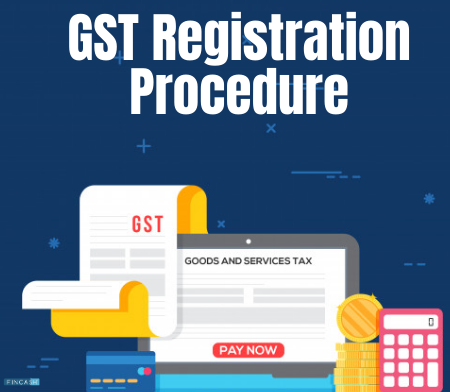Browsing the Intricacies of GST Registration: A Comprehensive Guide for Entrepreneur
Browsing the complexities of GST enrollment can be a challenging job for several company owner, as it entails a myriad of guidelines, regulations, and refines that should be stuck to. With the ever-evolving landscape of tax obligation laws, ensuring conformity and understanding the details of GST registration is essential for the smooth operation of any kind of company. From establishing qualification and gathering the necessary paperwork to optimizing operations for optimal efficiency, this thorough guide intends to give company owner with the understanding and devices needed to browse the intricacies of GST registration effectively.
Qualification for GST Enrollment
Organization owners need to meet particular standards to determine their eligibility for GST enrollment. Generally, businesses with a yearly turnover exceeding a specific threshold are required to register for Item and Services Tax (GST) This threshold differs by nation, yet it is vital for business owners to remain informed regarding the certain policies in their jurisdiction. In addition, services associated with interstate products, e-commerce, or the provision of certain specified products and services may likewise be mandated to register for GST, despite their turnover.
Moreover, organizations that are registered under any previous tax obligation routine, such as VAT or solution tax, are typically called for to change to GST enrollment. By adhering to the needed criteria, organizations can smoothly browse the complexities of GST enrollment and operate legitimately within the tax obligation framework.
Papers Required for Enrollment
To complete the GST registration process, services require to collect and send a detailed set of papers. The crucial records needed for GST enrollment commonly consist of evidence of organization enrollment or incorporation such as the Certification of Unification, partnership deed, or any other enrollment certification.
In addition, details records connected to the nature of business, such as a list of solutions or products supplied, HSN codes for goods, and SAC codes for solutions, might be needed - Why choose CFO Account & Services for GST registration in Singapore. It is vital for organizations to make certain that all papers submitted are accurate, current, and in the suggested style to prevent any type of delays or problems in the GST enrollment procedure
Refine of GST Registration
Having actually put together the requisite documentation, companies proceed to start the GST registration procedure by involving with the on the internet portal assigned for registration. This on the internet portal is the Product and Solutions Tax Network (GSTN) website, which acts as the main system for all GST-related activities in India. Upon accessing the site, companies are called for to fill out the GST enrollment kind with precise details concerning their service activities, turn over, and other appropriate details.
When the kind is finished and submitted on the portal, the GSTN confirms check it out the details supplied by the business. The candidate might be required to offer extra details or clarification if any inconsistencies are located. Following effective confirmation, a GST registration certificate is provided to business entity. This certification contains a special Item and Solutions Tax Recognition Number (GSTIN) that is used for all GST-related deals.
It is necessary for businesses to guarantee that the information offered during the GST registration process is accurate and up to date to avoid any potential concerns or hold-ups in getting the GST registration certificate.
Understanding GST Compliance

Businesses require to be knowledgeable about the various GST compliance needs based upon their turn over, nature of services or items, and the states in which they run. It is critical to remain updated on any adjustments in GST regulations and guidelines to avoid any type of non-compliance issues.
Non-compliance with GST regulations can cause substantial fines, penalties, and also legal consequences. Organizations need to invest time and sources in informing themselves and their staff on GST compliance. Looking for professional aid from tax experts or specialists can also aid in navigating the complexities of GST compliance and guaranteeing that organizations run within the legal structure.

Tips for Optimizing Organization Workflow
For improved effectiveness and productivity in business procedures, calculated planning and structured processes are essential parts. One idea for optimizing organization procedures is to leverage modern technology effectively (Why choose CFO Account & Services for GST registration in Singapore). Applying the best software remedies can automate repeated jobs, improve precision, and enhance total process performance. Furthermore, performing routine performance assessments and collecting comments from staff members can offer beneficial insights for recognizing bottlenecks and locations for renovation.
One more vital element is prioritizing jobs based upon their importance Full Article and target dates. By creating a clear hierarchy of jobs and establishing reasonable timelines, companies can make sure that vital activities are finished promptly. Additionally, promoting a society of open communication and collaboration among staff member can cause raised performance and development.

Conclusion
To conclude, navigating the complexities of GST registration calls for a clear understanding of qualification criteria, needed documents, registration processes, and compliance requirements. By sticking to these guidelines and enhancing service procedures, entrepreneur can ensure smooth procedures and compliance with the GST guidelines. It is vital for services to stay enlightened and upgraded on GST guidelines to avoid any penalties or lawful concerns.
The vital files required for GST registration commonly consist of proof of company enrollment or consolidation such as the Certification of Consolidation, partnership act, or any other enrollment certification.Having put together the requisite paperwork, organizations continue to start the GST enrollment process by engaging with the on-line site marked for enrollment. Upon accessing the site, organizations are required to load out the GST enrollment form with exact details concerning their service activities, turn over, and other relevant information.
In order to preserve adherence to GST policies and stay clear of penalties, organizations should focus on comprehending GST conformity. By adhering to these standards and optimizing service operations, service proprietors can guarantee smooth procedures and compliance with the GST guidelines.